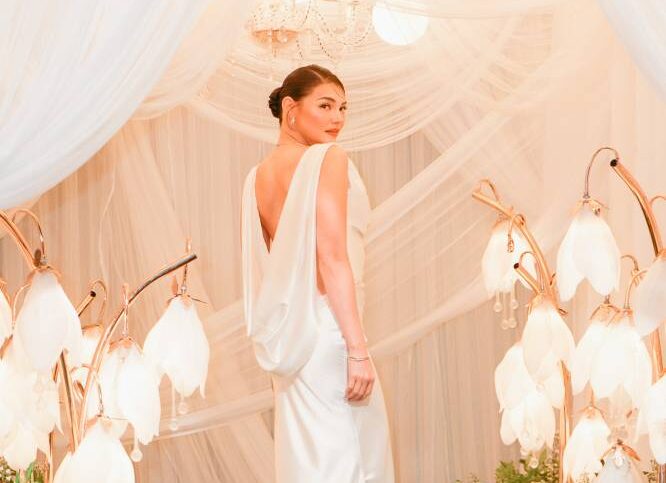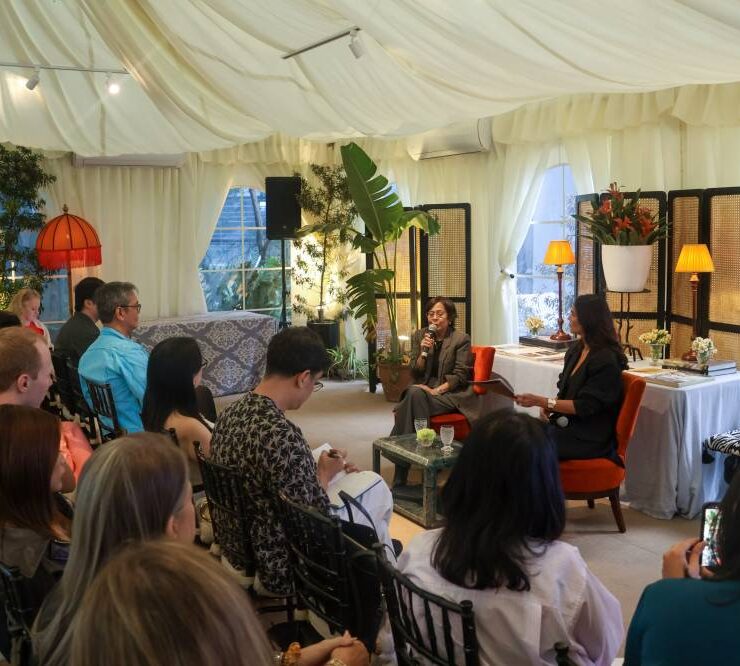For Rhian Ramos, acting is an exercise in empathy

Rhian Ramos will never forget the first time she auditioned for a role in a television series. In 2006, in a waiting room on the seventh floor of the GMA Network headquarters, the then-15-year-old newbie tried her hardest to memorize the script for Leah—the leading lady opposite Richard Gutierrez in “Captain Barbell.” She couldn’t; her Tagalog wasn’t the best at that time. But what she lacked in fluency, she made up for with an instinctive grasp of the scene.
So whenever a line was thrown at her, she answered back in English—all while keeping the essence of the Tagalog lines intact.
For reasons that still escape her to this day, Ramos got the part. “I still don’t know how I got accepted, but I’m thankful. They made some adjustments to the character to make it appear like she had just returned from the US,” she recalls.
The show was a success. Before long, Ramos was getting recognized in public, with people calling her Leah, coming up to her, and talking to her as if she had just stepped out of the screen. It was her first brush with fame— her “first taste of show biz.”
“It changed my life,” she says. But maybe not in the way she first thought.
By her own admission, Ramos didn’t have any “artistic goals” when she was starting out. Until her 20s, she saw acting as a job—not a passion or even viable career path. “You can’t control how long people will like you,” she once thought. But the money wasn’t too shabby, though. With her first paycheck, she bought an Armani Exchange hoodie (which she still wears, by the way).
“I just wanted to earn money, put up a business, and quietly grow old somewhere not in front of the cameras,” she shares in a recent interview, shortly after renewing her contract with GMA 7.
Diverse, out-of-the-box roles
But nearly 20 years in, she’s still in front of the cameras. And it’s no longer the paychecks that excite her—it’s the prospect of playing characters far removed from who she is, in shows that dare to push boundaries.
Her breakout part in “Captain Barbell” could very well have boxed her into similar ingenue roles, or set her in the typical leading lady path. And though she did venture down that road once in a while (“Stairway to Heaven,” 2009), she also didn’t shy away from projects that could be deemed as risque, especially for free television. “The Rich Man’s Daughter” (2015), for instance, had her playing Jade, a woman navigating societal pressures while in a lesbian relationship—a rare break from the heterosexual love stories that dominate local primetime.
Ramos also gravitated toward diverse genres and embraced unconventional roles, showcasing her versatility as an actress. She dabbled in horror (“Ouija,” 2007), gender-bending comedy (“La Lola,” 2008), psychological thriller (“Silong,” 2015), and surrealist live action-animation (“Saving Sally,” 2016).
Now, she can’t imagine not acting.
“I fell in love with it and I think it shows that I really do… There’s so many expressions I want to get out of me. When I see something I’ve never done before, or act with someone I’ve never worked with before, I see it as an opportunity for growth,” she says. “It’s been 20 years and I think the roles I’ve been getting are only getting better and meatier.”
Indeed, two of her most recent characters are among the most compelling in her filmography. In the crime mystery “Royal Blood” (2023), she portrayed Margaret, a murder suspect who uses her religious, conservative facade to hide her temptations and her struggle with alopecia. And in the ongoing fantasy series “Sang’gre,” she reigns as Mitena, the regal and menacing ice queen, wounded by abandonment and fueled by vengeance.
While some actresses balk at playing villains or morally gray roles that don’t quite align with their desired image, Ramos has no such reservations. As an actress, she has always believed that most—if not all—characters go through the same spectrum of human experience: the joys, the pains, the good, and the bad. And for that very reason, she says, the act of bringing a character to life becomes an exercise in empathy.
“I don’t judge the characters I play. When you don’t judge, you don’t get hangups like, ‘Ayokong gawin ’yan kasi masama ’yan,’” Ramos tells Lifestyle Inquirer. “I see the characters as a human, so I do everything I can to give them justice. When I have to play someone who appears bad or morally gray, I see it as an opportunity to understand other people.”
“Acting is empathetic work,” she stresses. “When I play characters, I play their truths. And then there are some characters that compel me to take risks and bare my soul.”
Staying grounded
Clearly, people see right through her portrayal of Mitena, who’s quickly becoming one of Ramos’ most iconic roles. She’s a hit among young viewers and a fodder for internet memes. Now, it’s almost impossible for her to walk in public without getting called Mitena.
“People would randomly bow to me! I ran a 10k event recently, and the people at the water station were calling me, ‘Mahal na Kera’ (Mitena’s royal title). There was also a time I stepped into a cafe and there was someone dressed in a Mitena costume, and everyone just started screaming,” she relates. “I was like, ‘Oh my God, what’s happening? This isn’t real life.’”
But despite her continued success, it’s important, she says, not to get ahead of herself—especially in this industry, where the smallest compliments can easily make you believe your own hype. Stay humble. That’s one of the most crucial lessons she has learned over the years.
In fact, on her hip is a tattoo of an automotive spoiler, a device typically fitted to race cars to keep them stable and grounded at high speeds. “It’s a reminder to keep myself grounded as I move forward,” she says.
For Ramos, that means surrounding herself with people she loves—people who will tell her the truth, no matter how painful it is. That includes her family, close friends, her boyfriend Sam Verzosa, and her bosses at GMA 7, who “stayed by my side at my worst and treated me like a human being, not a business commodity.”
“Hold on to your faith and the people who truly love you,” Ramos says. “I can count on two hands the people in my core group. And I wouldn’t be the same person if even one of them hadn’t been in my life.”





















